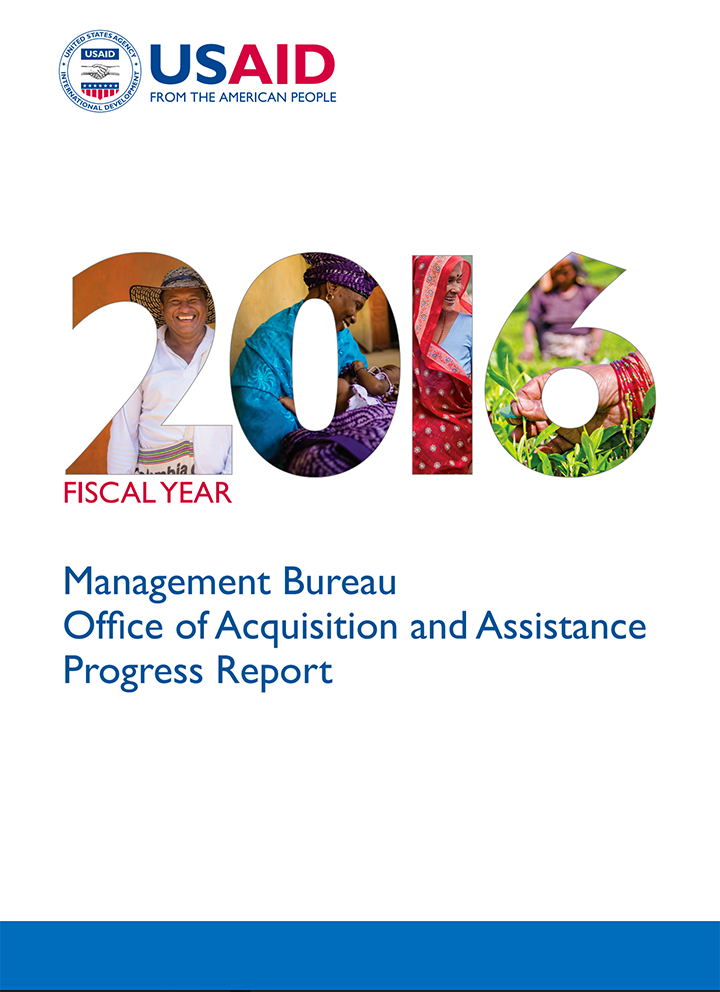- Work With USAID
- How to Work with USAID
- Partnership Opportunities
- Resources for Partners
- USAID Partners
- Acquisition & Assistance Ombudsman
- Compliance
- Acquisition & Assistance Policy Directives
- Archived Notices
- Indirect Cost Rate Guide for Non-Profit Organizations
- Procurement Executive Bulletins (PEBs)
- Implementing Partner Notices Portals
- Partner Vetting System
- Progress Report - Fiscal Year 2016
- Branding
- Get Involved
- Careers
USAID values the input and contribution of its partners.
To achieve our mission of ending extreme poverty and promoting resilient, democratic societies, the Agency works with more than 4,000 active partners in more than 100 countries around the world. With so many partners in so many different countries, sharing information and resources can be a challenge. This section of the website is set-up as a resource for new and existing partners.
Information Available:
-
USAID Partners -- Directs you to USASpending.gov, which is a searchable database that provides information on USAID’s most recent awards and implementing partners.
-
Compliance -- USAID is dedicated to protecting the integrity of our foreign assistance efforts and the taxpayer funds entrusted to us to save lives and improve livelihoods. Find out more about USAID’s Compliance Office and how to report concerns.
-
Ombudsman -- Ombudsman helps to ensure equitable treatment of all parties participating in USAID's contracts and grants (acquisitions and assistance) pre-award, post-award and administration functions. Find out more about the Ombudsman.
-
Acquisition and Assistance Policy Directives (AAPD) -- The official source for the latest updates in acquisition and assistance (A&A) policy and requirements.
-
Procurement Executive Bulletins (PEBs) -- Informational notices issued to USAID Contracting and Agreement Officers on general guidance, best practices, policy reminders, and frequently asked questions.
-
Partner Vetting System -- USAID has a pilot program that tests vetting policies and procedures, evaluates the resources required for vetting, and seeks input from stakeholders about the impact of vetting USAID-funded delivery of foreign assistance. Learn more about USAID’s vetting efforts.
-
Indirect Cost Rate Guide for Non-Profit Organizations -- The Indirect Cost Rate Guide has been prepared to assist non-profit organizations to understand the requirements for the determination of indirect cost rates for application on cost reimbursable grants and other agreements awarded by the United States Agency for International Development (USAID).
-
Implementing Partner Notices Portals (IPN Portals) -- The Bureau for Management’s Office of Acquisition and Assistance (M/OAA) created the Implementing Partner Notices (IPN) portals -- one for acquisition awards and one for assistance awards, to assist with the implementation of universal award modifications/amendments and streamline communications to USAID’s partners. The IPN Portals are the single point where USAID posts and disseminates proposed universal bilateral modifications/amendments for awards, which can be accessed electronically by registered partners and USAID staff.
-
Branding and Marking -- Guidelines for how USAID’s identity should be used.
Additional Resources:
The Automated Directives System (ADS) contains the organization and functions of USAID, along with the policies and procedures that guide the Agency's programs and operations. ADS series 300 contains the Agency’s policies and procedures related to Acquisition and Assistance.
Stay Informed:
To stay up to date on the latest information about working with USAID. Sign-up for the A&A e-mail distribution list. USAID uses the list to announce events, updates to the Business Forecast, resources for working with USAID, and additional helpful information. You can sign-up for the list here.
UNSOLICITED PROPOSAL
What is an Unsolicited Proposal?
An unsolicited proposal is a written proposal for a new or innovative idea that is submitted on the initiative of the offeror for the purpose of obtaining a contract with the Government, and that is not in response to a request for proposals or any other Government-initiated solicitation or program.
Basic Requirements for an Unsolicited Proposal
USAID is always looking for those who can contribute new ideas consistent with the Agency’s development assistance objectives in Guinea. USAID prefers to issue competitive awards whenever possible in order to ensure that we achieve the best value and strongest solutions from those who can deliver the desired results. While we accept unsolicited proposals for review, potential offerors should be aware that only in highly exceptional cases are such proposals likely to be funded.
A valid unsolicited proposal must:
- Be innovative and unique;
- Be independently originated and developed by the offeror;
- Be prepared without Government supervision, endorsement, direction, or direct Government involvement;
- Include sufficient detail to permit a determination that USAID support could be worthwhile and the proposed work could benefit USAID's research and development or other responsibilities;
- Not be an advance proposal for a known USAID requirement that can be acquired by competitive methods;
A Valid Unsolicited Proposal must include:
- Basic information, including—
- Offeror's name and address and type of organization; e.g., profit, nonprofit, educational, small business;
- Names and telephone numbers of technical and business personnel to be contacted for evaluation or negotiation purposes;
- Identification of proprietary data to be used only for evaluation purposes;
- Names of other Federal, State, local agencies, or parties receiving the proposal or funding the proposed effort;
- Date of submission; and
- Signature of a person authorized to represent and contractually obligate the offeror.
- Technical information, including—
- Concise title and abstract (approximately 200 words) of the proposed effort;
- A reasonably complete discussion stating the objectives of the effort or activity, the method of approach and extent of effort to be employed, the nature and extent of the anticipated results, and the manner in which the work will help to support accomplishment of USAID's mission;
- Names and biographical information on the offeror's key personnel who would be involved, including alternates; and
- Type of support needed from USAID; e.g., facilities, equipment, materials, or personnel resources.
- Supporting information, including—
- Proposed price or total estimated cost for the effort, in sufficient detail for meaningful evaluation;
- Period of time for which the proposal is valid (a six month minimum is suggested);
- Type of contract preferred;
- Proposed duration of effort;
- Brief description of the organization, previous experience in the field, and facilities to be used;
- Other statements, if applicable, about organizational conflicts of interest, security clearances, and environmental impacts;
Before you submit an Unsolicited Proposal:
- Ensure that you are familiar with USAID’s country- or regional-based programs;
- Carefully read the requirements for submission
- Review the Guidelines for Submitting Unsolicited Contract Proposals
Related Resources
- The USAID Grant & Contract Process: A Basic Guide
- The Development Experience Clearinghouse - The Agency’s online resource for USAID-funded technical and program documentation
|
Health |
||
|
1 |
RTI International |
|
|
2 |
John Hopkins University |
|
|
3 |
Management Sciences for Health |
|
|
4 |
Jphiego |
|
|
5 |
ICF Macro International |
|
|
6 |
John Snow Inc. |
|
|
7 |
United States Pharmacoepeia Convention, Inc. |
|
|
8 |
Management Sciences for Health |
|
|
9 |
John Snow Inc / Advising Partners and Communities Services |
|
|
10 |
Abt Associates |
|
|
Democracy, Governance & Conflict |
||
|
1 |
Search for Common Ground |
|
|
2 |
IFES, National Democratic Institute |
|
|
3 |
Catholic Organisation for Human Promotion |
|
|
4 |
Catholic Relief Services |
|
|
Agriculture |
||
|
1 |
Winrock International |
|
|
2 |
John Snow Inc |
|
|
3 |
Development Alternative Inc. |
|
|
4 |
Cultivating New Frontiers in Agriculture) |
|
|
5 |
Winrock International |
|
|
6 |
(ACDI/VOCA) |
|
|
Global Health Security Agenda |
||
|
1 |
FAO |
|
|
2 |
Metabiota |
|
|
3 |
Development Alternative Inc. |
|









Comment
Make a general inquiry or suggest an improvement.